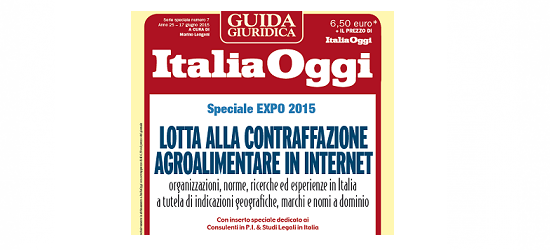
Loredana Mansi, Trademark Attorney and Raffaella Previtera, Attorney
Metroconsult Srl None (Turin), Milan, Genoa
The agriculture and food Made in Italy is identified primarily with those products of the Mediterranean diet (e.g., pasta, cheese, wine, pastries, sausages) that are strongly attached to the “Italian style” and that, furthermore, represent a major portion of the export of this sector. Agri-food products can be subject to trademarks (individual or collective marks), labels, indications for the traceability of these products, as well as Indications of the origin or provenance (the so-called “Made in”). Each of these cases is governed by national and supranational law. According to well-established Italian case law, the words “Made in” indicate the origin or place of provenance of a product from an entrepreneur and not from a geographical territory (except what will be said about PDO and IGP agri-food products). It should be noted that, at the moment, the indication of Italian origin (or another EU country) of a product is not mandatory, but if it is applied, it must be truthful and in compliance with the law. The aim of the legislator is to protect consumers from misleading information. The main Italian reference legislation of the “Made in” is Law no. 350/2003, in particular art. 4, paragraph 49, as subsequently amended (Legislative Decree no. 135/2009 and Law 166/2009) refers to the case described in Article 517 of the Italian Penal Code. Under law 350/2003, the Made in Italy labelling on products must be compliant with the current legislation contained in the Community Customs Code EC no. 450/2008, establishing the criteria for defining the origin of a product. In compliance with the provisions referred to in Articles 23 and 24 of the said code, they are considered Italian and Made in Italy can be affixed to: 1) the goods wholly obtained in Italy or 2) the goods that underwent their last, substantial, economically justified processing or working in an undertaking equipped for that purpose, and resulting in the manufacture of a new product or representing an important stage of manufacture. The origin or provenance of agri-food products which are covered by PDO or IGP is always geographical, as the qualities of said products, their processing and production are linked to a specific geographical area. For the so-called “generic” agri-food products, the Made in Italy labelling is subject to the above-mentioned provisions of Articles 23 and 24 of the Community Customs Code. At national level, the law provides for the mandatory indication of origin for specific categories of product, such as fresh fruits and vegetables, beef and poultry, fresh milk, eggs, fish products, tomato puree, honey, olive oil. With respect to the criterion of last substantial processing or working, the Italian case-law has had on several occasions to decide whether the Made in Italy indication on an agri-food product was or was not lawful. In the decision of 3 September 2012, the Tribunale di Nocera Inferiore (Italy) held that a marketing of products containing tomato concentrate produced in China, on which the Made in Italy label was affixed, constituted a breach of the relevant legislation on origin, insofar as the sole addition of water and salt, as well as pasteurisation, packing and canning didn’t constitute a substantial processing on this product. In another case, the Court of Cassation concluded that the made in Italy labelling for fruit salads was correct, whose raw material came from foreign countries, as substantial working had taken place in Italy. There is no doubt that the Made in Italy label in recent years has gained commercial appeal and that any product labelled Made in Italy immediately gains added value on the market. However, it is clear that its fraudulent application on products (or on packaging) exposes the holder to civil, administrative and criminal sanctions.
Hence the importance of constant vigilance on the aspects mentioned above and the need for a thorough evaluation of the issues that can arise.
